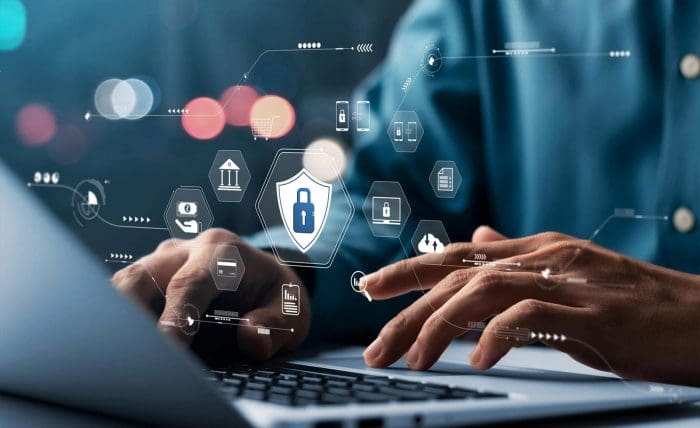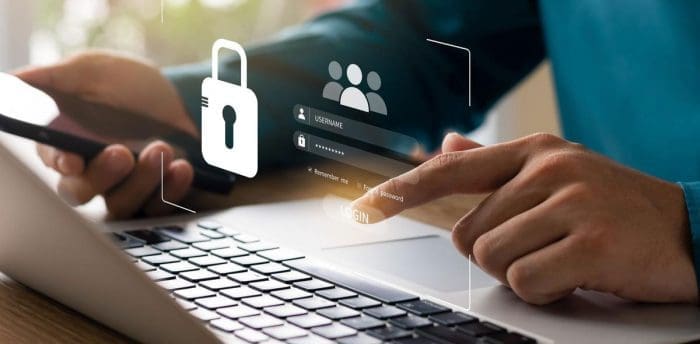
Data Loss Prevention: The Secret Weapon Businesses Need
Don’t let a data breach cripple your business. Our guide to Data Loss Prevention (DLP) reveals the secrets to stopping data leaks and keeping your information safe.
Your London Telecoms and IT partner

Every time we write a blog on cyber-security, we remind our readers that online threats are increasing in direct proportion to the scope of IT in businesses today. You may wonder why we do that! We have dug up a few reports from the last year and we would like to share these alarming figures.
The National Crime Agency (https://www.nationalcrimeagency.gov.uk/) claims that frauds are “largely” underreported and that only 13% of the victims report their losses to the authorities. The National Fraud Investigation Bureau says that a staggering 80% (four-fifths) of these are cyber-enabled. An article in https://www.dbxuk.com/statistics/data-breach-statistics-2023 mentions the names of some mighty British companies who have recently faced ransom demands from international cyber terrorists. Additionally,
The security team at the tech giant Microsoft faced a threat as recent as January 2024. While they assure patrons that the Microsoft-hosted customer-facing systems have not been compromised, there is an investigation on whether sensitive information from the emails of several senior employees had been extracted or not (https://msrc.microsoft.com/blog/2024/03/update-on-microsoft-actions-following-attack-by-nation-state-actor-midnight-blizzard/).
Feeling like a sitting duck for cyberattacks? Worried about data breaches and downtime? Our cyber security services identify and fix vulnerabilities before they become a nightmare. Sleep soundly knowing your business is protected.
These are indeed dangerous times that we live in! Now, let’s keep the reported numbers aside, and imagine the magnitude of losses incurred due to the crimes that are not reported. In the wake of the Corona pandemic, when the tiniest of businesses were moving their marketing and selling transactions online, hackers were widening their nets! With none to basic computer or IT knowledge, criminal masterminds from the third-world countries were matching steps with the top high-tech coders and hackers of the world. Some of the ideas were as simple as – tiny unnoticeable or too-small-to-argue amounts scammed from a really large number of people.
The creativity of these scams has escalated so much in the last few years that the importance of browsing, yes just browsing nothing other than secure sites cannot be overstated. Therefore, along with conscious password settings, it is vital for people to also understand the basic risks and the terms associated with cyber threats. At Portman Tech we are happy to provide tips and tools to safeguard your online privacy, discuss the best practices for internet security, compare the features of leading internet security software, and help you choose the right internet security solution for your needs.
Every connection to the internet, exposes your systems to a huge array of risks, malware and ransomware being the most common. Malware refers to malicious software that can enter your computer or mobile device without your knowledge and wreak havoc on your system. The most common way of installing malware in your systems would be through emails that have virus infected attachments.
Additionally, when you surf through insecure sites (http://), download free apps or programs, install fake or ‘cracked versions’ of software, it is possible for scamsters to lodge malware into your system unnoticed. Ransomware is when a certain type of malware has thus been installed into your system, and is blocking your access to or threatening to corrupt your files, until and unless you pay a ransom.
To protect yourself from these threats, it is essential to have strong malware and ransomware protection in place. Portman Tech will always insist that you invest in a reputable internet security solution. This is the first step towards safeguarding your online experience. These anti-virus software programs will use advanced algorithms to detect suspicious & malicious software on your devices and suggest you to remove the same. In fact, an anti-virus software will continuously monitor your system for any signs of malware or ransomware.
Another advantage is the real-time scanning that is available when you are accessing a particular website and when you plan to download or install a certain app or program. There is a feature called web filtering; this automatically blocks access to suspicious or malicious websites, and also scans all emails received to try and prevent phishing attacks. Adhering to such internet security protocols, be assured that you have protected your devices and yourself, and now you can browse the internet with peace of mind.
At Portman Tech, we believe that proactive measures are the best way to deal with malware and ransomware. Here are some pointers that are “The Bible” of internet security and online privacy:
While we update ourselves and safe-guard our systems, be sure that the criminal geniuses are also working day-n-night to break into our fire-walls and decode our codes. When you relax or get distracted with your actual profession, they will catch up, and so we recommend that you stay on your toes, or recruit professional bodyguards like Portman Tech to monitor unscrupulous activities in your systems.
Everyone likes complimentary services and we expect the authorities to provide intelligent and advanced infrastructure around us. With the modern smart-cities offering free Wi-Fi zones, it becomes very easy to stay connected while on the go.
Unfortunately, such public Wi-fi areas offer open access due to their unsecured nature. Most of the times, you will not need any form of authentication to log in and hence this could pose significant risks to your data security. Hackers can easily intercept your internet traffic on public Wi-Fi and gain access to your sensitive information, such as passwords and credit card details.
Some of the best practices that you should follow to try and protect your data on public Wi-Fi networks are listed below:
A frustrated unsuccessful scamster will try harder to gain access, use ‘trojans’ and various other tricks to gather information that they can use against you or to further access your finances. Let’s keep them working hard!
While we keep the above ideas in our minds, lets engrave a few points in our hearts as well:
Sharing such best practices with colleagues, friends and maybe even your family will significantly reduce the risk of falling victim to cyber threats.
The market offers several internet security software solutions today. If you are a company like Portman Tech, in the heart of London city, you will have easy access to multiple services. However, it is necessary to give this a little more thought at the beginning, and to eventually make an informed decision that will save you big time in the future. A few of the top internet security solutions that are available in the UK are listed below:
These are some of the international brands available in the UK for internet security. Our experts at Portman tech consider factors such as cost, features, ease of use, and customer reviews while suggesting security to our partners.
A tiny café at the corner of the street, a stand-alone departmental store or a chain of stores in a mall, even the real estate big guns or day-to-day service organisations require the internet to fire up their businesses. Whether you are a critical segment (like hospitals), educational institutions, complex law firms, or even charitable NGOs, connecting to the internet and managing multiple transactions is essential in every day of your life. Just like any other crucial decision of your business, choosing the right technical partner to shield your business from criminals will also require some effort. Consider the following factors:
To ensure that the solution meets your specific needs, it is important to sit with your consultants and narrow down your options before you choose the right internet security solution.
Don’t let cyber threats stifle your ambition. Grow with confidence with our comprehensive cyber security services. Our proactive approach safeguards your data, allowing you to focus on scaling your business without fear.
Apart from employing a robust internet security software, we recommend that you enhance your online security and add a layer of protection with these steps:
Let’s be clear about this; such precautions will definitely strengthen your online security and however not eliminate but only minimize the risk of cyber threats.
“Prediction is very difficult, especially if it’s about the future”’ said Niels Bohr, the father of the atomic model and a Nobel Laureate. Bohr’s words are true when it comes to cyber security and predicting where and how criminals might attack next. We can only try and be a step ahead of them. We relax, become complacent, they catch up, and then it’s too late! Take control of your online experience, reap the benefits of the 21st century’s industrial revolution, and defend your hard-earned money by taking appropriate security measures.
This article is brought to you by Portman Tech Solutions Limited, a leading provider of internet security solutions in the UK. Contact Us to explore our range of products and services.
ABOUT THE AUTHOR

Vikas Shah joined Portman Tech as Chief Technology Officer in 2018. IT has always been his passion and he has built his career around technology. Vikas closely follows developments in technology, providing clients with solutions that fit their requirements.

Don’t let a data breach cripple your business. Our guide to Data Loss Prevention (DLP) reveals the secrets to stopping data leaks and keeping your information safe.

Explore key concepts, principles, and best practices to protect your valuable information. For comprehensive information security management solutions in London.

Let’s explore the significance of Passwords And Internet Safety, using two real-life examples of internet fraud incidents

0800 862 0120
hello@portmantech.com
123 Aldersgate Street, London EC1A 4JQ